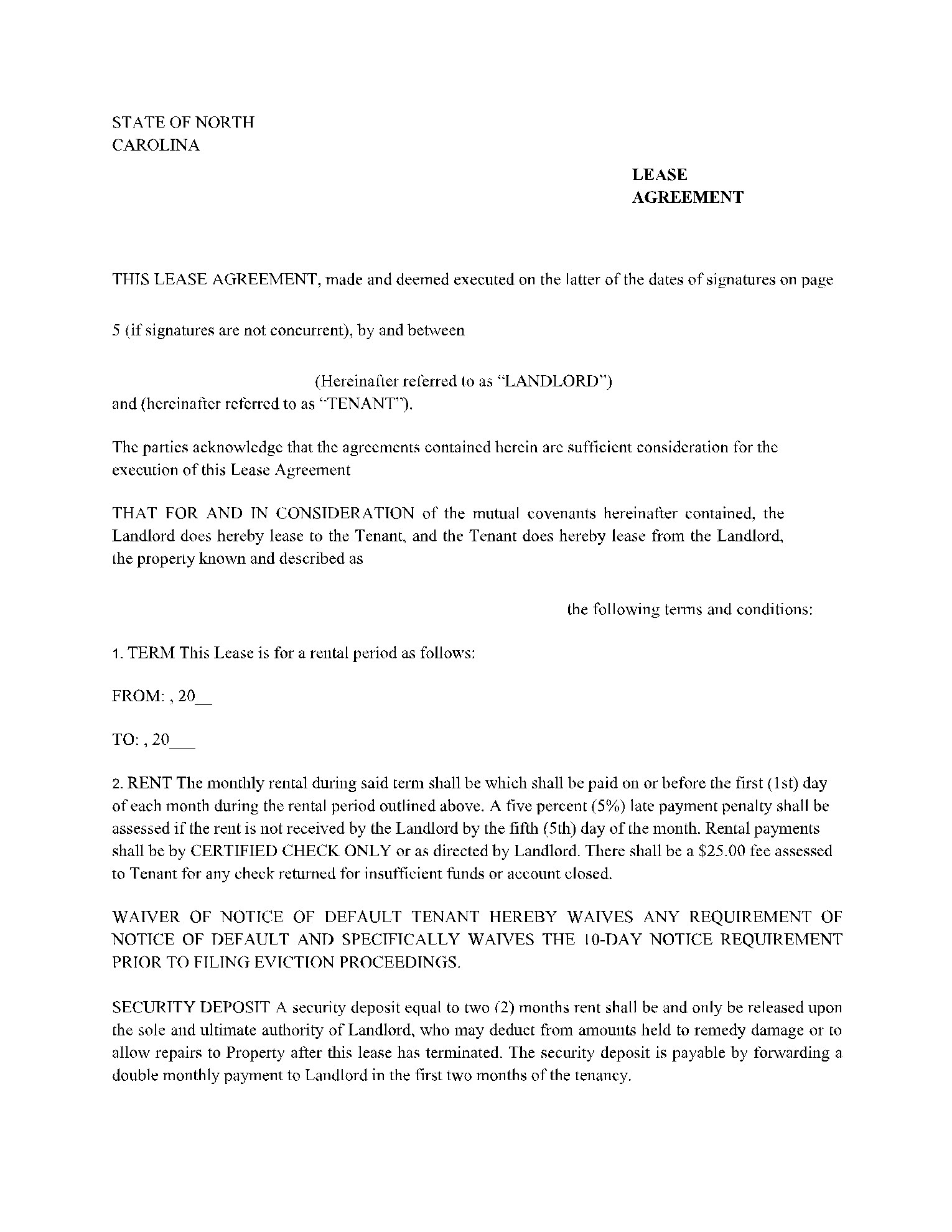The most commonly used North Carolina (NC) rental agreement is a standard residential lease agreement (ordinarily good for a lease term of 12 months). North Carolina is the home of two major cities Charlotte and Raleigh with an estimated 10 million residents. If you are looking for a property or renting out a property, then including the points below in your NC rental agreement will be perfect.
What is a North Carolina Lease Agreement?
A North Carolina rental agreement is a contract formed for the renting or leasing of property between a landlord and tenant. North Carolina rental agreements are needed for tenancies for 12 months or longer. The agreement may be used for residential or commercial plans and it becomes legally binding to both parties after signing. Usually, a landlord can modify the terms of a North Carolina rental agreement by giving a written 30-day notice of change of terms of the tenancy. It is a legal agreement, as well as an immensely effective document full of essential details, such as how long the tenant can keep the property and the rules and terms of living.
How to Write a Standard North Carolina Lease Agreement?
A standard North Carolina lease agreement includes all the required information of the property and both parties, it includes:
- The name and residential address of both the landlord and the tenant
- The full legal name and age of all tenants who will live on the property
- The address of the rented property
- The starting and ending date of the lease
- Which utilities the landlord is liable to provide and which the tenant will be liable to pay
- The amount of the rent due per month, when it is due, how and when it can be paid
- Any advance rent paid and the date the tenant may walk into the property
- The charges of any late fee that must be paid if the rent is late
- The cost of the security and pet deposit (a security deposit receipt might be required)
- Any other charges the tenant may pay (like for a replacement key)
- Whether smoking is permitted on the property
- Any other terms, like for pets, are allowed and if there are any restrictions
- The following declaration before the signature: You confirm having read and agreed to all of the terms of this agreement.
Lastly, the tenant and the landlord must sign the North Carolina lease agreement. It can be signed online for free with the eSign feature of CocoDoc.
Before signing a lease, the landlord can use the North Carolina rental application to evaluate a tenant.
What Disclosures Must Be Made in a North Carolina Lease Agreement?
Landlords must disclose the following information to each North Carolina tenant:
- Late fees - For weekly payments, the maximum late fee is four dollars or five percent of the weekly charge. The maximum late fee can be fifteen dollars or five percent for the monthly payments. Landlords can only charge late fees if the rental payment is late five days or more (check the late rent notice).
- Domestic violence - So long as 30 days written note is provided, victims can avail of quick termination.
- Marijuana use policy - The state law allows the use of medicinal marijuana. However, it’s prohibited to cultivate it.
- Dishonored payment fees - Each dishonored payment interests a maximum fee of twenty-five dollars.
- Shared service arrangements.
- Mold disclosure - The landlord is needed to disclose any damage, including but not related to firewater, and insect damage.
What do You Need to Know about North Carolina Lease Agreement Deposits?
A security deposit includes unpaid rent and repairs that are behind normal wear and tear. It's necessary to handle security deposits correctly to dodge winding up in small claims court.
After the tenant has left the premises and given the property to the landlord, they may get their deposit within thirty (30) days. If there is damage to the premises, the landlord may give notice within the thirty (30) day period advising that an additional thirty days is required to estimate for the repairs.
Conclusion
This article can lead both landlords and tenants in North Carolina, to help them deal with many legal topics and problems without needing a lawyer. A North Carolina residential lease agreement protects both parties from disputes. Whether you are a landlord or a tenant, you can call a North Carolina lease agreement a security agreement.
